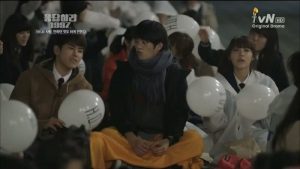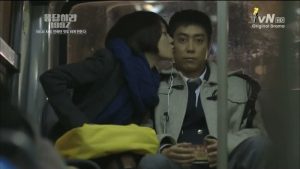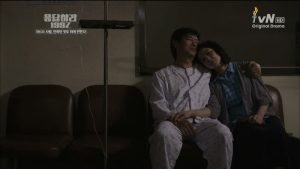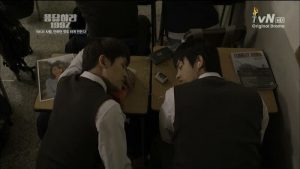At the beginning of the drama, it’s hinted that somebody at the table is getting married! However, this prompts a greater discussion about the economic state in 2012, and how it’s even comparable to the Asian Financial (IMF) Crisis during 1997, where newlyweds cannot afford owning a home. As you may remember, the Asian Financial Crisis is in full-effect by the end of episode 5. Viewers can understand the impact of the financial crisis when we see Dong-il and Il-hwa in the hospital: a shared patient room costs 300,000 won per day (in today’s rate, it’s $330 CAD), and Dong-il’s paycheque is docked in half. I reckon the Seong family are a part of the middle class, but they are still not safeguarded by the precarious conditions from the fluctuating economy. How has the financial crisis impacted families of different classes? How did the economy in 2012 compare to 1997?
It is interesting to note that “love” is the theme of this episode, highlighting the ups and downs of love.

For Yun-je, he’s still attempting to win Shi-won’s heart. He feels threatened by Jun-hee’s friendship with Shi-won, thus he’s determined to transform himself into who he thinks Shi-won’s ideal type is. He buys carp-bread (붕어빵), sits through the cold nights, jams to H.O.T, hoping to get her attention. Ultimately, his selfishness takes over, asking Yu-jeong for all 4 tickets to a basketball game which she went through hell and back for, just so he can have alone time with Shi-won and continue his quest to win her over. Yun-je is oblivious to Yu-jeong’s feelings and motives, leaving her completely heartbroken. Ultimately, his plan to have alone time with Shi-won backfires, as she’s bored out of her mind during the game and misses his confession.
Similarly, Yu-jeong tries to change herself into the more desirable girl by studying basketball prior to the game, impressing Seong-jae and Hak-chan much to their surprise. The attention she receives from her other male friends are meant to make Yun-je jealous, but it backfires. It becomes clear towards the end of the episode that Yun-je’s heart was with Shi-won. Yu-jeong breaks down crying in the bus, but Hak-chan quickly comes to rescue.

Since Hak-chan’s entrance to the drama, he’s portrayed as the “comically weird” character, unable to see women outside of pornography. However, he quickly develops into a gallant and heroic character when Yu-jeong’s love wasn’t reciprocated — he stands up for her. He consoles her on the bus, and putting her needs/desires first rather than letting his quirks take over. For once, we see Hak-chan taking initiative and becoming a emotionally sensitive person, rendering him as a more realistic and reliable character for the viewers. By the end of this episode, we know that Hak-chan and Yu-jeong are getting MARRIED!
Life for the Seong family isn’t going swell either. Although Si-won rejoices being an official executive member of H.O.T’s Pusan fanclub, Tony 오빠 reveals publicly that the letter that Shi-won wrote with her own blood made him uncomfortable. Again, we see signs of love and affection backfiring. Shi-won is upset that she’s put her feelings/desires first before Tony’s by sending him a disturbing gift. On a positive note however, Shi-won is pregnant! But who is the baby daddy? We’ll just have to wait and see…
 Meanwhile, the Seong parents are still trying to cope with Dong-il’s diagnosis. Although the doctor concluded that his illness is not fatal and will not spread, Dong-il remains to be pessimistic. His feelings are reinforced when he sees parallels with his life and the main character of a TV drama suffering cancer. Il-hwa is enraged at the drama’s writer, upset and angry about how people can capitalize and glamorize an illness that affects so many. She does this to support her husband, but also many others who unfortunately follow the same trajectory. In the end, she makes a heartfelt plea to the drama writer after calling every night, asking her to write a happy ending for the leading man of the drama, giving hope to viewers who watch it. Dong-il is thankful for both the ending of the drama, but most importantly for the unsolicited love and support from his wife. Are dramas obligated to reflect social perspectives and realistic depictions? Or should dramas not be taken seriously and be understood solely as another form of entertainment?
Meanwhile, the Seong parents are still trying to cope with Dong-il’s diagnosis. Although the doctor concluded that his illness is not fatal and will not spread, Dong-il remains to be pessimistic. His feelings are reinforced when he sees parallels with his life and the main character of a TV drama suffering cancer. Il-hwa is enraged at the drama’s writer, upset and angry about how people can capitalize and glamorize an illness that affects so many. She does this to support her husband, but also many others who unfortunately follow the same trajectory. In the end, she makes a heartfelt plea to the drama writer after calling every night, asking her to write a happy ending for the leading man of the drama, giving hope to viewers who watch it. Dong-il is thankful for both the ending of the drama, but most importantly for the unsolicited love and support from his wife. Are dramas obligated to reflect social perspectives and realistic depictions? Or should dramas not be taken seriously and be understood solely as another form of entertainment?
Notice that Jun-hee is one of the main characters who’s arc has failed to develop in this episode. We understand that he’s a caring and supportive friend, especially to Shi-won. Also, it’s revealed that Jun-hee has a crush on Yun-je, but he’s yet to confess. This would’ve been a good episode to expand Jun-hee’s relationship with Yun-je, but writers of the show decided not to. Do you think this was a conscious decision by the writers, given South Korea’s stance on LGBT representation (especially in the 90s)? Personally, I find it quite upsetting that the arc for a character who holds so much significance, culturally, is developing so slowly. I hope we get to see more of how Jun-hee addresses his identity and the different nuances in his life.

Can’t wait to read your comments, and I’ll see you guys on the next post!
Kelly x
Hi Kelly, thank you for the summary and the thoughtful questions you posed. Your question about whether dramas reflect reality depictions and social perspectives, is answered by Dong-Il when he says, “Don’t you know, dramas reflect reality.” The directors of Reply 1997 are perhaps trying to convey the message that Reply 1997 contains a depth of moral messages and social issues that Korea has faced or is facing. For example, when Si-Won cut her finger to write a letter to Tony, a member of H.O.T. I felt like it was making reference to the incident when a sasaeng fan mailed a letter to Ok Taecyeon (2PM) in her menstrual blood. It takes on a critical view of sasaeng fans in Korea by using Si-Won to epitomize the crazy sasaeng fan who would sleep in front of her fan’s house, participate in fan wars, and participate in questionable fan activities. Another social issue Reply takes is shown in the next episode when students talk about their future hopes. In an ultracompetitive society, students in Korea usually take on hopes that they think their parents would like. They never take the time to reflect on what their passions are and their inner curiosity. Students that visit Tae-Woong bring and bring with them jobs that do not match with them such as the the girl with the thick Busan accent who wants to be an announcer, the dumb girl who wants to be a doctor, and Dan-ji the girl who can’t pain but wants to be a painter. The drama later depicts all of them doing what matches their talents best. I believe that Reply 1997 included the scene of Il-Hwa pleading the author to change the plot of the drama to hint to the audience the power drama writers yield. The writer of Reply 1997 too yields significant power and is possibly using this power to encourages audience to reflect on social issues in Korea such as sasaeng fans and the passion-less students who are victims of the ultracompetitive Korean society.
The article regarding 2PM’s Taecyeon receiving a bloody letter that says “Ok Taecyeon you can’t live without me.” (trigger warning: there is an actual picture of the letter written in blood)
http://njaejoong.blogspot.ca/2009/12/2pms-taecyeon-receives-bloody-fan.html
Hi Kelly thank you for your post!
Your second question is very intriguing. I have to say that I think there really isn’t a clear cut answer to your question. It’s very evident that dramas have an effect on our being whether or not we want it to. In the episode, we the audience can clearly see how the plot line affects the middle aged women (and on the father Dong-il) because they identify with the characters. Especially during the time of the IMF, as the nation’s plight became the peoples’ plight, it’s understandable that people would want to watch something that distracted them from their current situations, rather than add on to it (1).
Moreover, as Bumsub Jin and Seongjung Jeong demonstrated in one of the articles that we had to read early in the semester, it’s not just middle aged/senior individuals who are affected, there is a correlation between drama consumption and lifestyle choices of young women as well. I would also say that it’s not limited to Korean drama either because personally, House of Cards has seriously messed up and made me question my views on politics.
Viewers are definitely aware that dramas are fictionalized, but as the episode demonstrates, people have a tendency to immerse themselves within it regardless. If forced to one side, I would have to say that since consumers of popular media are just so diverse with our own separate beliefs, I think that the onus is on us, not the producers of such content, to accept or reject it in the forms as it is presented.
Source:
(1) Williamson, Lucy. “What eurozone countries can learn from South Korea.” BBC News. July 09, 2012. http://www.bbc.com/news/business-18719079.
Jin, Bumsub, and Seongjung Jeong. “The impact of Korean television drama viewership on the social perceptions of single life and having fewer children in married life.” Asian Journal of Communication 20, no. 1 (2010): 17-32.
The financial crisis in the 1997 impacted families of all classes. Various major corporations filed for bankruptcy including Daewoo which was considered to be as large or larger than Samsung, SK, LG etc. It also affected the workers of these corporations as well as other corporations as there were massive unemployment. Since 1997 corporation began to hire more contracted employees rather than full time employees incase of another financial crisis. To answer your second question, the economy in 2012 has its problems and benefits compared to 1997. Housing prices have risen dramatically resulting in hardship in purchasing a home (probably similar to the situation in Vancouver). Currently due to THAAD, rising tensions between South Korea and China has negatively effected South Korea’s economy as well. Lastly, South Korea lacks diversification compared to that of 1997. In the past Samsung did not dominate every sector in South Korea’s economy. Being so dependent on one corporation could be detrimental if Samsung makes a management mistake or if Samsung fails one day.
A fun video showing how Samsung is involved in every sector by CNN http://money.cnn.com/2017/05/10/news/economy/south-korea-president-moon-economy/index.html
An interesting paper that actually addresses people during 1997 is
Yoon, Janice Jia. “IMF Family Portraits: How the 1997 Asia Economic Crisis changed families in South Korea” Harvard YISEI (2001): 24-35. https://www.hcs.harvard.edu/~yisei/issues/fall_01/yoon.pdf
Like what previous posts mentioned, some people are extremely connected to the drama they watch. Like how various celebrities mentioned in interviews, when they act a antagonist role, people (normally the elderly) think that the actor is actually a bad person in real life. I am guessing that the drama the people at the hospital were watching was a drama that has high viewer ratings at the time. Especially for people who were diagnosed with cancer during the drama was playing, news that the main character could potentially die within 3 months due to cancer is likely very depressing. From my own experience as a research assistant at a university hospital in Korea, I know that they design (Interior) the major hospital in a way to reduce depression among patients which is especially high among patients with terminal disorders.
Hey Kelly, thanks for your post!
I found your third question very interesting in the sense that Reply 1997 tackles and somewhat simulates many social issues that are still applicable today. In my opinion, I feel that dramas should be obligated to reflect social perspectives through the lens of realistic depictions because it helps the audience relate with issues that the public should be concerned about. While in the case of Reply 1997, I felt that the ‘drama within the drama’ scene was a method that the directors used to bring to attention how the events of the show itself can have real life applications. A clear cut example would be the theme of the father-daughter relationship explored within the previous episode; whereby the the actions and consequences of the characters were used in order to communicate the narrative to the audience.
Furthermore, to answer your last question, I felt that the show’s decision to limit and slow down Jun-hee’s character development is entirely intentional. Given South Korea’s views on the LGBT community back in the day, I felt that the show’s decision was justified in order to simulate a similar situation that an individual such as Jun-hee would experience back in the 90s.
A recent article highlights how the big push for LGBT rights only started around the mid-90s (the time frame of this drama) and thus, justifying both Jun-hee’s actions and his slow progression in character development. Moreover, the article also highlights how the stigma for LGBT is still strong, leading to controversial actions such as the 2015 Queer Culture Festival being banned by the police during their march and Samsung and Google Play agreeing to block gay dating apps such as Hornet in 2013. While homosexuality isn’t illegal in Korea, it is still interesting to see how the LGBT community will react now under the rule of Moon Jae-in.
Avery, Dan. “For LGBT Activists In Korea, The Message Is “Not Now, Later”.” LOGO News. March 08, 2017. Accessed October 14, 2017. http://www.newnownext.com/homosexuality-lgbt-korea/03/2017/.
Katz, Evan Ross. “Samsung, Google Play Censor Gay Dating Apps In South Korea.” LOGO News. July 12, 2015. Accessed October 14, 2017. http://www.newnownext.com/samsung-google-play-censor-gay-dating-apps-in-south-korea/07/2015/.
Thanks Kelly for the post. In regards to your second question, I agree with Sean on how the onus is on the viewers as to how they interpret or accept the content presented. However, the producers do have a responsibility of how they present the facts so that the viewers can clearly distinguish fiction from non-fiction. Adding on to Edward’s comment on how people (normally the elderly) may believe the content as a real depiction if they are extremely connected to it, if the content revolves around a sensitive topic, like the time period when Korea was colonized by Japan, it can influence many people’s perspective and emotions. To give a most recent example, the movie 군함도 (The Battleship Island) was criticized by many for having fictional elements to exaggerate the event. The emotions of the viewers toward Japan were intensified and many were lead to believe this to be a factual movie. Overall, what I want to say is that the media does have influence on the viewers, regardless of how one may WANT to accept the content, therefore the producers are partly responsible for how the viewer responds to the content.
Thanks for your post Kelly.
“Are dramas obligated to reflect social perspectives and realistic depictions? Or should dramas not be taken seriously and be understood solely as another form of entertainment?”
This episode shows both realistic and entertainment aspects of consuming a drama. Lee Il-hwa constantly tries to convince Dong-Il that the drama they watch is for entertainment purpose and he’s not going to die. But Dong-Il disagrees with her saying that dramas are based on real life. This eventually leads Lee Il-hwa to plead the writer of the drama to alternate the story. She says that ever since the main character has fallen ill, there is no more laughter in the hospital. Either way dramas are influential and it totally depends on the way we consume them.
I agree with Raymond’s opinion on dramas being obligated to reflect on social perspectives. Dramas should be based on real life situations as they raise awareness and past or current concerns among the audience. They also act as a major culture breaker between foreign audience. While watching Korean dramas, we can get insights on their culture and traditions. For example, broadening our knowledge of daily used Korean terms, behaviours, trends, school system, etc. connecting the foreign audience to the country. The same concept applies to any other foreign dramas. Although, dramas should also be made for entertainment purposes. They can act as a diversion from the daily demanding lives of people and be enjoyable and fun to watch.
This article discusses Korean movies and dramas and how they affect both domestic and international audience. It further discusses how the Korean wave positively affects tourism and industries.
Parc, Jimmyn and Hwy-Chang Moon. “Korean Dramas and Films: Key Factors for Their International Competitiveness.” Asian Journal of Social Science, no. 41 (2013): 126-149
http://ecipe.org/app/uploads/2016/05/Parc-Moon-2013-Korean-wave.pdf
Great write up on Episode 6, in response to the questions you bring up my responses are as follows.
Are dramas obligated to reflect harsh reality or should they be all in fun-I think in this case its bad timing. If you are going through what Dong-il is the last thing you want is some negative drama ending. Although if he were not in his health situation, and watching for pure entertainment, I doubt him or Il-hwa would be as emotionally charged as they are. So yes I do think its for story and entertainment, however their can be bad circumstances in peoples lives which make them inappropriate for the time or audience.
When it comes too Jun-hees identity my opinion follows here. I do think that it makes for a more complicated drama, if his feelings for Yun-je were expanded on. It seems Korea does have a progressive movements for LGBT as seen at this pride festival.
http://www.pinknews.co.uk/2017/07/16/thousands-of-people-turned-out-for-the-biggest-south-korea-pride-yet-this-weekend/
There are also thousands of protestors who came out against it. Its clear that going that evolving his character more in this way could create some ripples in the Korean ocean so to speak. However the producers are already making him out to be LGBT, so perhaps going farther with his relationships would not be that big of a deal.
Kelly, great set up to the episode– I esp. like how you inserted questions for the other students in italics– all of those are really great questions, too.
연실, perhaps this interaction about the reality of dramas and the power of the script writer is also a reference to how much power Korean fans can wield on cultural production– just as sasaengpaen can influence what a K-pop artist does (or other types of more positive fan pressure can influence them), likewise the scripts of many dramas have notably been changed due to fans’ comments on message boards while filming was still taking place. Less than power of the writer– both 시원 and her mom represent ‘fan power.’
예찬, good job, and good job using the literature. However, inserting the (year) after the mention of the two author’s names would be the perfect academic way to correlate your writing with the biblio entry at the end of your comment.
Edward 규훈, Good job. I esp. like how you searched out new literature to cite relevant to the questions.
Zifeng, It would be more effective to say something like a ‘recent article in X newspaper’ or a ‘2016 news story by Al Jazeera’ instead of just saying a ‘recent article’ as article in academic writing tends to refer to academic articles in journals. So we need to keep things clear. I’m not sure i agree that the drama has to stay true to 1997 or 1998 thinking on LGBT, as it’s made recently and is a flashback– and even if it’s made recently, it can take a more activist/humanizing stance if it chooses to (showing stigma, but also showing acceptance as in several recent Korean dramas).
도희, excellent comment and wonderful illustrating example. Yes, media producers have responsibility^^
Navneet, nice job, one of your best comments yet, and I like how you introduce a relevant piece of academic literature for further consideration.
Alex, thanks for your comment. I personally think the producers/scriptwriter wimped out on the Junhee story line.